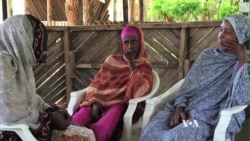The al-Shabab militants who have long battled for control of Somalia also have recruited thousands of young people in Kenya, leaving many families bereft.
In the Kenyan town of Isiolo, a key target of a new al-Shabab recruitment drive, there is agony, fear and lost hope.
At a relatively quiet open-air restaurant three kilometers outside Isiolo, several women meet to talk about their fears, their struggles to get loved ones back from the Somali militant group al-Shabab, and how to keep others out of the hands of recruiters.
For Zainab Hashi, the wound is still fresh.
Her son left home May 1 for what she thought was to be an Islamic retreat. A week later, she received a phone call.
"I lost my son. One day he disappeared, he left here on the first day of this month. He was with four other boys," she laments.
The caller told Hashi they were in Liboi, a town on the Kenya-Somalia border. When she asked why her son hadn't phoned, the caller responded that Kenyan security forces had arrested the boys and that her son was afraid but fine.
A week later, her teenage son and three others were still in custody in Liboi, she says, accused of trying to cross the border to join al-Shabab.
Hashi seeks comfort and advice from Halima Hassan, another woman who says her own teenage brother has been with al-Shabab for eight months.
She says before he left, he asked for about $40 for a school trip and that was the last time her family saw him.
Three weeks later, he called home and told his family that he was with al-Shabab, was fine and was making a lot of money.
However, Hassan fears the worst.
"There is no way he can be found. He has become a criminal who has no sympathy and kills people. Even if he came back, he would bring that criminality here," Hassan says, adding she "will pray for God to guide him."
Each time Hassan sees her brother's schoolmates, she feels bad and cries, she says. Hassan has yet to understand why he chose a gun instead of a pen and a book.
Vast network
Al-Shabab has intensified its recruitment of the mostly Kenyan youth and other pastoralist tribes from the larger Isiolo County to beef up its ranks.
Al-Shabab operatives within Isiolo town have trained their eyes on mostly young and unsuspecting school girls and boys.
A vast network of influencers and recruitment agents freely roam around town, identifying idle youth who are their immediate targets. Once the identified youths have been lured to join the jihadist movement, another team takes over.
At least 200 boys are missing from schools within Isiolo and their whereabouts remain unknown.
VOA tracked recruiters complicit in a special kind of terror that uses poverty as an excuse to radicalize youths and turn them against education.
A man in his 20s who identifies himself only as Ali explains his involvement in al-Shabab recruiting.
He says boys like Hashi’s son are drawn into the jihadist movement with promises of new educational opportunities. His work entails looking for idle young men and bringing them to the mosque, he says. From there, other people take over.
"I tell the boys they can go for an Islamic retreat for about four months. They then come to the mosque. The youth are made to believe they have sinned and are in need of God’s forgiveness," Ali says,referring to the recruitment plan.
Those who heed the teaching are taken for further Islamic instruction but are effectively recruited into al-Shabab.
Radical preachers depend on Ali’s peer connections to lure more and contacts into the militant group. The entire process is shrouded in secrecy.
Ali says he has stopped looking for recruits and is no longer involved in such activities. However, some Isiolo residents told VOA he is still in the business.
Al-Shabab mostly encourages the families of its recruits with social support, promising cash rewards whenever needed. The callers hardly ever disclose their location, only stating they are far away.
Al-Shabab recruiters contend that fighters hardly ever engage in the business for money, but for the sake of religion.
Living in fear
Families of al-Shabab recruits live in fear of reprisals from their radicalized children. Their fear intensified after the Garissa University College attack in early April, when four gunmen stormed the campus in Kenya’s northeast. After a battle with security forces, 147 people and the gunmen were dead.
In late April, Kenyan security agencies published a list of 85 people allegedly involved in terror-related activities.
Named on that list is Abdi Ibrahim Adan, a primary school teacher in Isiolo. He denies any participation in terrorism.
"I really got surprised when I saw my name in the list," Adan tells VOA. "Primary school teachers are registered. Teacher's presence is marked daily like pupils. I wonder where our intelligence discovered a primary school teacher is part of al-Shabab while he was teaching in school daily."
Adan says some people named on the list should be interrogated about goods traded between Kenya and Somalia.
"I believe there are some people who are genuinely supposed to be questioned about their activity. Why are they doing it now?" Adan asks. "There are people doing business in Somalia in getting sugar, which is under al-Shabab control in Somalia."
Missing students
Adan says more than 200 students have not reported to his school this year and no one knows their whereabouts.
"We never follow up where these children are," he says. "We just assume they have transferred to other schools, but they could be gone to join the al-Shabab. The girls could have been married off; boys could be gone."
Concern is so widespread about children leaving for Somalia to join al-Shabab that Isiolo town has a specific venue for mothers seeking information on their youngsters.
While Hashi agonizes about her missing son and wants to travel to Liboi, she has no money to make the journey.
Isiolo resident Abdio Abdi says she cannot understand why the town's youths are choosing terrorism over people who love them.
"We blame those who taught them the wrong things and thinking," Abdi says. Recruiters and other operatives "have made families, relatives and neighbors suffer. They [youths] left those who loved them so dearly and joined such groups. That’s really bad."







